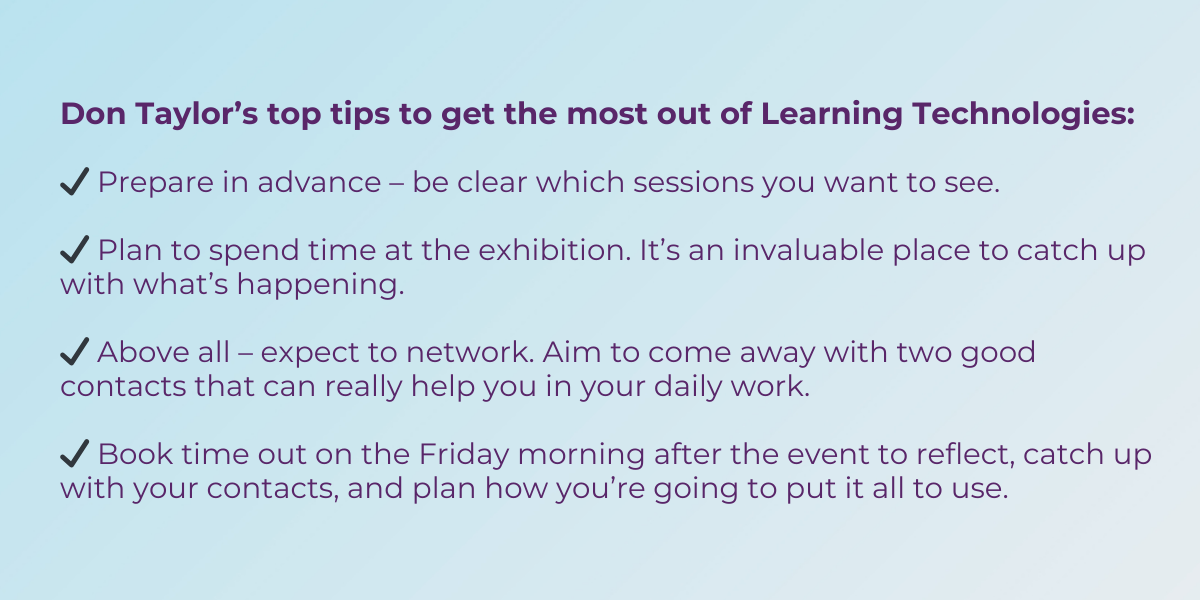Learning Technologies 2024 Preview: Interview with Donald H Taylor
)
Learning Technologies is celebrating a big birthday! It is twenty five years old – a quarter of a century. A lot has changed since the conference doors opened for that first event in 2000. Audience numbers, for starters. Back then, 200 attendees was considered a good turnout. Now, 700-800 people attend the conference alone, rising to 10,000 in the exhibition space. And it’s gone global, both in terms of attendees - almost 50% of people travel in from outside the UK – and location, with events in Germany and France as well.
“In 2000, we were the new kids on the block,” says Don Taylor, who has held the position of conference chair since that first event. “Now the exhibition and conference are part of the annual L&D calendar. It’s how you catch up with people from the industry, and how you hear about what’s happening.”
The number of tracks has also increased over the years – from two in 2000 to five in 2024.
But it's not just the numbers that have changed. The scope of the conference and the exhibition has also changed, reflecting the seismic developments in learning and in the nature of work over the past 25 years. Globalisation, AI, the hybrid and remote working revolution, the shift from jobs to tasks, the destabilisation of employment and the consumption of technology for learning are all wider trends that Taylor says are having a huge impact on the sector. Technology is of course driving a lot of this. At the turn of the century it was all about the proliferation of personal computing and of the world wide web. Now it’s AI that is taking the workplace by storm.
But, some things have remained constant in the L&D space (or training, as it was called back in 2000). Taylor highlights four themes that he says are just as important now as they were 25 years ago:
- New technologies – obviously – and that changes most years, although some years there is a single, dominant technology, like this year, and other years there is a spread of new ideas. Other years there has been less novelty and the conference has focused more on implementation.
- Part of this is the need for delegates to keep up to date – not just on technology, but on methodologies, too. I think that we’ve played an important role in helping important ideas spread faster – including, for example the idea of the importance of informal learning, in the late 2000s
- Showing the value of learning has always been an essential topic for conference delegates, and I expect that to continue.
- Developing the skills of L&D professionals remains perennially important. This year for example we are looking at AI literacy and data skills – it’s something that never stands still.
This year there will be 200 seminars and 200 international exhibitors at Learning Technologies, with seven key themes: AI, data and analytics, skills, talent and learning, future L&D, professional development, tools and techniques, programme implementation and learning experience design.
Skills have always been a hot L&D topic, but Taylor says that accelerated when the World Economic Forum released its Future of Jobs report in 2020. “It’s the currency of business at the moment – it’s what people are talking about.” It is essential that organisations understand what skills they have and what skills they need for the future in order to deliver what they need to deliver. Only then can they work towards having the right skills and people in place. But Taylor also thinks L&D needs to be careful not to overlook the importance of attitude and knowledge as well.
The other really hot topic is, inevitably, AI. Currently, the debate is quite polarized around AI and that is likely to continue for a while as gen AI evolves and as people and organisations go through the pain of adopting the emerging technologies. Eventually, Taylor thinks AI will become as fundamental to people’s lives and as normal as electricity.
AI is already impacting hugely on the L&D function. Among other things, it is a content creation and distribution tool and it can do it all a lot more quickly and cheaply than any learning professional can. Where does that leave L&D? “There are a vast number of things that L&D needs to be able to do, which it’s not doing, in order to be successful for the future,” says Taylor. “We’ll be tackling some of that at Learning Technologies now and in the future.”
Looking back over past events, Taylor says some speakers really stick out and have had lasting impact – for him, it’s the educational expert Jay Cross talking about informal learning in the 2000s, learning content creator Amy Burvall talking about creativity and the neuroscientist Itiel Dror raising people’s awareness of neuroscience. Taylor has also enjoyed introducing delegates to new voices, including the computer scientist and visual artist Jaron Lanier, the businessman, academic and AI expert Daniel Hulme and the writer, presenter and comedian Timandra Harkness.
As the conference draws near, Taylor says he is excited by what he sees as three core benefits to attending events such as these in person, rather than watching a livestream or on video afterwards. They are: attention, connection and inspiration. “Attention - we don't typically devote ourselves to focus on something, because we are so bombarded via different channels for our attention. One of the great benefits from coming to an event is the fact that you make it your primary thing you're focused on. Connection – you meet people and develop close relationships. Having that network is crucial for people in a lot of ways. Finally, the inspiration bit - there is something different about being in a room physically to watching videos of an event afterwards. It's very difficult to explain what it is, but it's the same reason people watch football matches live, rather than just on TV.”

Roisin Woolnough 
Head of Content, Insights Media Ltd


)
)
)
)
)
)
)
)
)
)
)
)
)
)
)
)
)
)
)
)
)
)
)
)
)
)
)
)
)
)
)
)
)
)